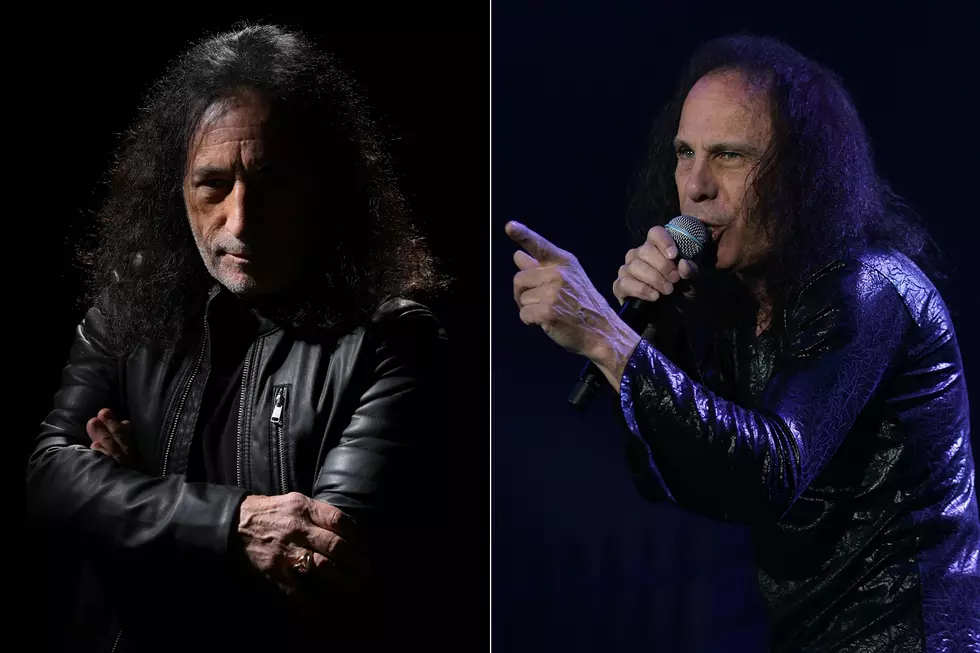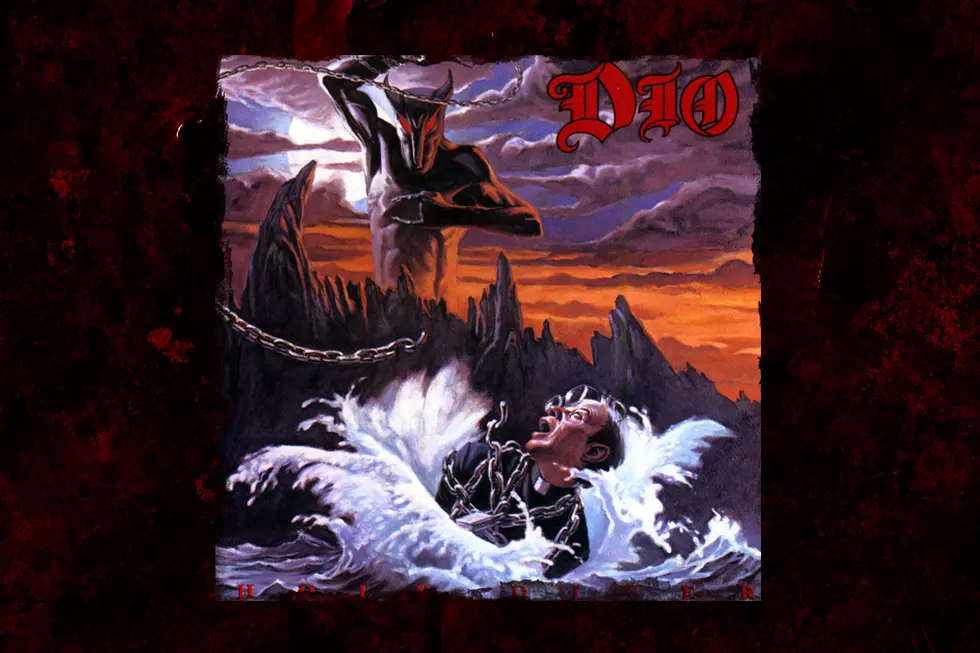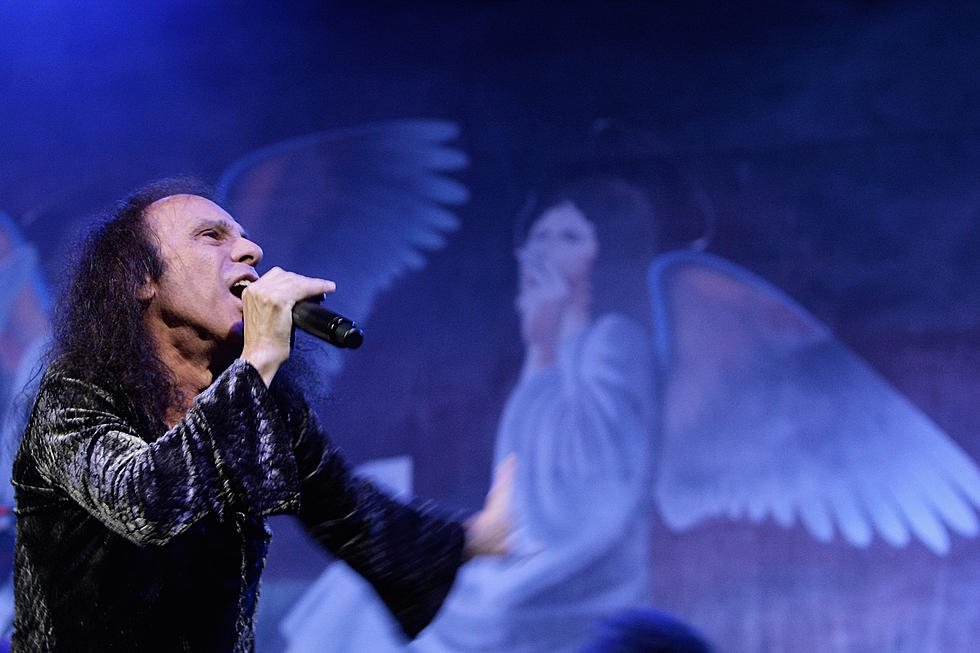
The Rods’ Dave Feinstein: Ronnie James Dio’s Last Recording + Love of ‘Family Feud’
While attending one of the "Dio Returns" hologram shows, we were fortunate enough to catch up with the late legend's cousin and former Elf bandmate Dave 'Rock' Feinstein. He's one head of the Cerberus that is the classic metal outfit The Rods, who just released Brotherhood of Metal, a scorching old school record that defends the genre and fights for all that is true.
In the interview below, Feinstein speaks about the unity heavy metal offers and the surprising realization that The Rods had such a dedicated fanbase the world over once their 2010 reunion took flight, offering anecdotes about his cousin, who is at the intersection of our conversation.
Following Ronnie James Dio's passing, the Feinstein solo song "Metal Will Never Die" surfaced and served as a poignant swansong for those reeling from one of metal's most heartbreaking losses. He explains how that song came to fruition years before the singer lost his battle with stomach cancer and takes us back to the family's childhood days where Ronnie took his first steps as a musician.
Our conversation ends on a lighthearted note as Feinstein offers up some lesser known anecdotes about Ronnie toward the end of his life.
Read the complete interview below and jam The Rods' "Louder Than Loud" while you do.
There's so much passion on Brotherhood of Metal. It can be tough to write lyrics about heavy metal without sounding cheesy or overindulgent — Manowar walk that tightrope really well, too, and you have a connection there. You hit that sweet spot so perfectly.
I really appreciate that because everything does come from the heart. With Manowar, Joey DeMaio and I have been good friends for many, many years and he has a strong allegiance to this whole brotherhood thing.
In the title track I wanted to portray the idea that it’s not just the three of us in the band that are the brothers, it’s all the fans – male and female – who are part of this brotherhood of metal because we love the music and we love what it represents.
You’re proof of it because you’ve listened to it. It makes me feel good a lot of times songwriters write a song they really love but it’s not what the people who listen to it will get from it. You can interpret a lot of songs and lyrics in different ways, so, I’m glad to hear that you interpreted it in the right way, and I hope a lot of the other friends feel the same way about it.
A lot of rock and metal today is lyrically centered around personal emotion and inner struggles. For you and Ronnie James Dio, it's more of an escape from reality, though Ronnie always lined his fantasy with real-world truths.
I listen to Ronnie's lyrics and they always have a meaning to them and a lot of times with any lyrics you can interpret them in different ways, but Ronnie always wrote with a passion and he wrote with a true meaning to the song. I always strive to do that and put my words and lyrics in music into something that will make other people feel good about themselves and maybe they can associate with the same type of feelings that I might be having at the time.
Ronnie had a way of putting reality into an imaginary sect or part and he was so excellent at doing that. He was a brilliant person and a brilliant writer, and to do that in any way at all is a gifted thing.
When you got the call in 2010 to reunite The Rods and play a festival in Norway, what did that do to change your perception of the band's legacy?
When we stopped the band it wasn’t for ill feelings for any of us, we just got burned out on the whole business part of it.
The thing with being a musician is that it's something that never goes away. I started feeling like I needed to play. I started to write songs, and I didn't have a band so I started to record solo albums. They don't mean anything really. If Keith Richards does a solo album, it really doesn't mean much, but if the [Rolling] Stones do an album...
I got a phone call from Carl, who I hadn't talked to in years, and he said, "I just heard your new solo album. It really makes me want to play." I said. "Well maybe we can do a reunion and do a couple of local shows. I said, "I'll give Gary a call and see if he's up for doing it," which he was.
We played a bar in my hometown, and then we played another bar where Gary lives. Because of the Internet, people came out of the woodwork to see these shows in these little small bars. They brought old albums for us to sign, and we didn't realize that we had all these fans all over, so we kept it going.
Once the word got out that we were playing again, we started to get solicitations from promoters of festivals. We've been to countries that we were never at even during our heyday — Japan, Brazil, Norway.
Going back to the thread of being a solo artist, I remember after Ronnie passed, your song "Metal Will Never Die" was released. It was so bittersweet, but a fitting storybook ending in a way for Ronnie to sing those words. At least for me, it offered some sort of closure. Dio was my first concert and losing him cut me particularly deep.
Here’s the story on that song...
The last 10 years of Ronnie’s life, he and I became quite close again. He lived in California, and I was in New York and his parents still lived in Cortland where we grew up. Those last 10 years of his life, I would go out there and visit him and we talked about doing an Elf type of reunion and doing an album.
Ronnie was really excited about it because he would play bass on that album again because, in the original Elf band, he played bass and sang. I would go there and we’d work on tunes and ["Metal Will Never Die"] was not one of the songs, but we’d work on things. Three years before he passed away, both of his parents got sick and died and he was coming to Cortland quite a bit.
At the time when I was working on a solo album and the Rods were doing an album. I had written the song "Metal Will Never Die." Carl had written the song "The Code," which is not a Rods style song. So Ronnie and I talked, and he said "Hey, I’ll sing a song on your solo album and I’ll sing a song on Rods album." Just out of the blue.
He was in Cortland an extra day so we could record a couple of songs. He sang world-class. The only time he might want to do a couple of takes is because you might want to try something different. So, those songs were recorded and they sat on a shelf for a couple of years. That's when the Heaven and Hell band came about and then he got sick and passed away.
It was so ironic the way fate is. That was probably one of the last songs he ever recorded. It's just like a very eerie kind of a feeling.
Before Elf Ronnie was a little bit of an R&B singer with Ronnie and the Red Caps. I remember hearing "An Angel is Missing" and I couldn't believe it was the same guy who sang "Holy Diver." What can you say about Ronnie growing up in the family? Was he always musical? Was he singing around the house a lot?
Ronnie played trumpet when he was a kid, and I played the trumpet. Ronnie was five years older than me so I looked up to him. He played in a band, and I wanted to play in a band. You know, he played the trumpet, and I wanted to play the trumpet. He was musical all along and very smart — he was president of his class in high school and was going to college and ended up leaving college to pursue his musical career.
Ronnie and the Red Caps was before my era, but I joined the band when it was Ronnie Dio and the Prophets. We were a club band doing four sets a night in bars.
I don't know if you've ever heard the recording of "The Way of Love" that he sang. It's a big ballad for a big singer. We recorded that during the Ronnie Dio and the Prophet days and then, of course, Cher had a big hit with it.
But Ronnie could have been another Tom Jones or Engelbert Humperdinck — His talent as a singer was that good. It just didn't matter what avenue he chose. If he wanted to be a solo singer and be a Tom Jones, and sing those kind of songs, he could have done that.
Actually, in his very first band he wasn't even the singer in the band. They did a recording back in the day and they had another guy that was the singer. Ronnie was just the bass player. Finally after that, they got rid of the bass player and Ronnie started singing and realized, "Hey, I can really sing."
Can you tell us something people would be surprised to know about Ronnie?
He loved Family Feud. When he was getting sick, I went to the house and we would watch reruns after reruns of Family Feud. I would go nuts because I was bored out of my mind, [laughs] and I didn't want to watch it. But he loved to watch it and I think it was the challenge of the questions because he had such a great vocabulary. I think it was very challenging for him to be able to answer the questions when they were asked because when the family or whomever they asked, they'd get it wrong, he would swear.
We'd go visit him and every day he'd pick it up the newspaper and we wouldn't do anything the whole day until the crossword puzzle was done. As the week went on, they got harder and harder and that's another reason I think his mind was so sharp and he was such a genius. There's so much in those puzzles vocabulary wise. It was a challenge to him, and he loved doing that.
Thanks to Dave Feinstein for the interview. Grab your copy of The Rods' 'Brotherhood of Metal' here.
Where Does Ronnie James Dio Rank Among the Top 66 Hard Rock + Metal Singers of All Time?
More From KKTX FM










